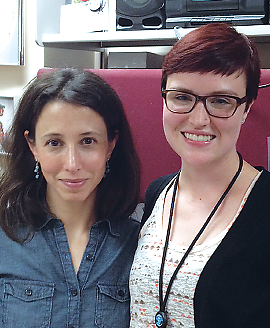Educator Has Mastered Art of ‘Cerebral Jujitsu’
The Psychiatric Emergency Service (PES) at St. Michael’s Hospital in Toronto is a unique entity within the postgraduate training program. This site is part of a departmental focus on meeting the needs of a diverse inner-city population. Patients seen in crisis often have complex issues spanning substance abuse, homelessness, HIV infection, and poor access to services.

Michelle Marlborough, M.D., B.Sc.N. (right), and Mara Goldstein, M.D.
It is in this often chaotic environment that Dr. Mara Goldstein thrives. She is full of enthusiasm, passion, and humor. Medical students and residents consistently rate their time at the St. Michael’s Hospital PES as one of the highlights of their training.
Dr. Goldstein knew she wanted to be a doctor at age 9, but it was a role-playing exercise focusing on personality disorders during medical school and a subsequent elective in emergency psychiatry with Dr. Mimi Israel that piqued her interest in psychiatry.
After completing her undergraduate medical training at McGill University, she went to New York University for her psychiatry residency and pursued a fellowship in forensic psychiatry. Dr. Goldstein reflected in an interview on the influence of her mentors during residency, in particular Dr. Carol Bernstein, the late Dr. Wendy Reeves, and the various dedicated psychoanalytic supervisors who frequently held supervision in obscure bars and restaurants in Manhattan.
Following graduation, she joined the staff at St. Michael’s Hospital, where she has worked for 10 years, with her primary area of interest being acute-care psychiatry. In addition, Dr. Goldstein served as director of undergraduate electives at the University of Toronto from 2007 to 2013 and recently began a part-time position as medical advisor at the College of Physicians and Surgeons of Ontario.
Dr. Goldstein’s contributions to psychiatric education at the University of Toronto have been recognized with two recent honors. She received the 2012 Robin Hunter Award for Excellence in Postgraduate Teaching (which she likens to “winning an Oscar”) and the 2013 APA Irma Bland Award for Excellence in Teaching Residents. “I believe I can provide a balanced view of psychiatry with healthy skepticism, and after having had such good teachers myself, there was never a question of whether to be involved in education,” said Dr. Goldstein.
She stated that her greatest reward is participating in the creation and development of psychiatrists as both professionals and people. Within emergency psychiatry, Dr. Goldstein maintains that “the cerebral jujitsu one has to master in order to be an effective teacher and clinician” keeps her on her toes and coming back day after day.
Outside of the hospital, Dr. Goldstein summons her creative and innovative teaching methods to deliver informative seminars on topics such as human sexuality and pop culture, blending issues in psychiatry with media-related ones. Recent notable sessions have included “Dysfunctional Families and ‘Arrested Development’ ” and “Narcissism in ‘Tropic Thunder.’ ” Dr. Goldstein has a natural ability to bring challenging clinical concepts to life in meaningful and memorable ways.
In the next 10 years, she envisions shifting her focus to public policy related to mental illness and aspires to one day be director of a psychiatry residency program. Along the way, she continually reminds residents of the importance of taking care of the self as “no one else is going to do it for you.” She is a keen proponent of “the art of doing nothing” during down time and balances her role as a devoted mother to three children with her professional life as a psychiatrist.
I am grateful for Dr. Goldstein’s mentorship, and my clinical experiences with her have been the most formative aspects of my training thus far. She has a unique ability to verbalize her decision-making process and takes time out from working in a stressful environment to explain her understanding of complex patients. She is always mindful of the ways in which clinical experiences can affect residents and creates an open and supportive space in which to reflect.
Her investment in my professional and personal success is without equal. When the end of residency arrives and I walk out the door, it will be Dr. Goldstein who helped me to put on my coat. ■



